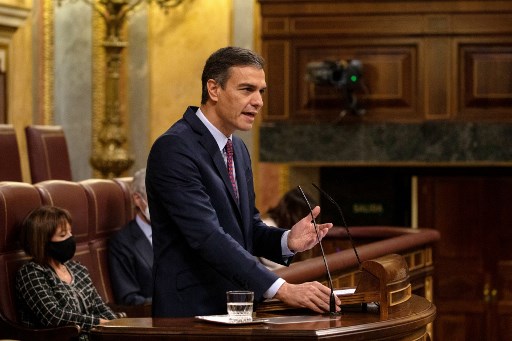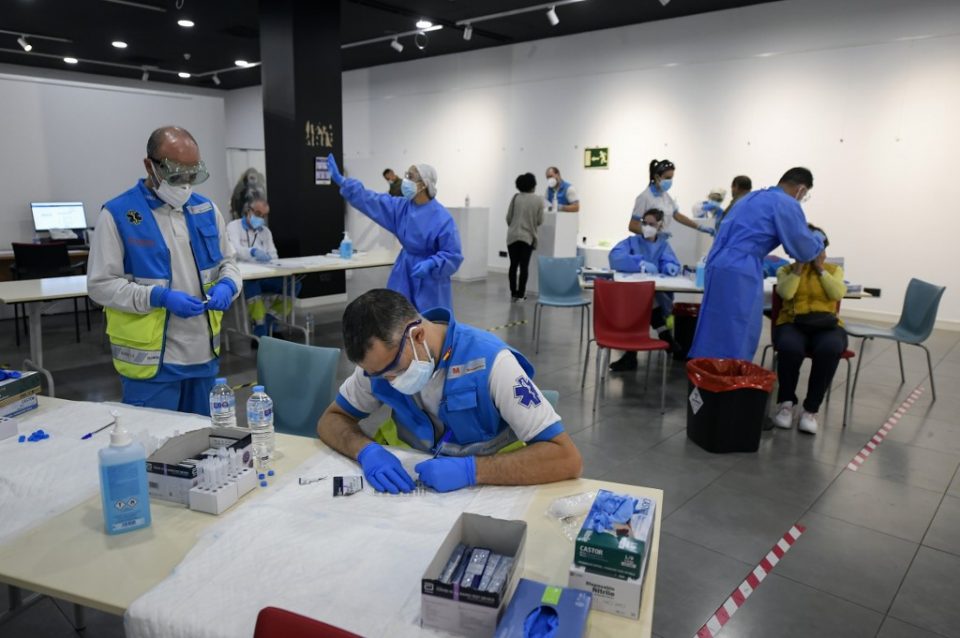
by Christian CHAISE
Agence France Presse
MADRID, Spain (AFP) — Spain’s “real number” of infections is more than three million, Prime Minister Pedro Sanchez said Friday, as regional authorities demanded tough government action to slow the spread of the virus.
Just two days after Spain officially became the first country within the European Union to pass a million cases, Sanchez said the true number was more than three times higher.
With the virus showing no signs of slowing, various regions urged the Sanchez administration to declare a state of emergency which would give them the legal right to impose a curfew — a measure increasingly applied across Europe.
Despite Sanchez’s remarks, he did not announce any major national steps to curb the virus.
“We need a state of emergency to be declared across the entire country,” said Inigo Urkullu, head of the Basque Country, the first region to demand such a measure.
His call was echoed by the regional heads of Extremadura in the southwest and Asturias in the north, both of whom said such a measure would enable them to increase restrictions.
In March, the government declared a national state of emergency allowing the imposition of significant restrictions on freedom of movement, keeping nearly 47 million Spaniards largely at home for some three months.
But when the measure ended in late June, responsibility for managing the pandemic was transferred to Spain’s 17 autonomous regions.
As cases have risen, various regions have imposed restrictions which have ultimately been overturned by the courts on grounds they didn’t have the authority to limit citizens’ basic rights.
– Tests detecting 70% of cases –
The latest figures show the virus has claimed nearly 35,000 lives in Spain, and infected 1,046,132 people but antibody testing suggests a far higher number.

“Seroprevalence studies suggest the real number of people infected in our country is more than three million,” said Sanchez.
He said only around 10 percent of infections were detected at the start of the pandemic whereas now, tests were picking up around 70 percent of cases.
Antibody studies, or seroprevalence research, are crucial for getting a clearer understanding of the scope of an outbreak and guiding decisions on how to contain it.
So far, there has been little agreement on the best way to slow the spread of a virus in Spain where the infection rate currently stands at more than 360 cases per 100,000 people.
On Friday, Health Minister Salvador Illa said the government was studying “the legal options” for enabling regions to declare a curfew but admitted it would likely need a national state of emergency.
Although the government can impose such a measure for up to a fortnight, it would need parliamentary approval to extend it — not a given in a chamber where the ruling leftwing coalition holds only a minority of seats.
– New restrictions in Madrid –
Since June, the measure has only been applied in the Madrid region where 4.2 million people in the capital and eight nearby towns have only been allowed to leave the city limits for essential reasons linked to work, school or healthcare.
That measure ends on Saturday, when restrictions drawn up by the Madrid authorities come into force, including a ban on all gatherings of people from different households between midnight and 6:00 am.
Bars and restaurants must also close at midnight and limit their indoor seating capacity by 50 percent, explained regional health chief Enrique Ruiz Escudero, saying the measures would “drastically reduce social activity, especially at night”.
Valencia and the Castilla and Leon region both said they would impose a nighttime curfew on their own, while the southern Andalucia region said it would do so in the city of Granada.
Sanchez’s government is not opposed to a curfew but wants all regions to agree on the need for a state of emergency which is not currently the case.
© Agence France-Presse







